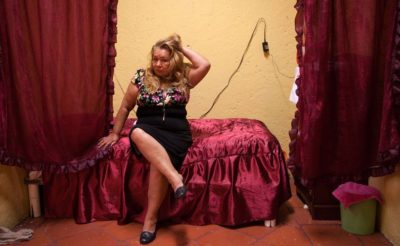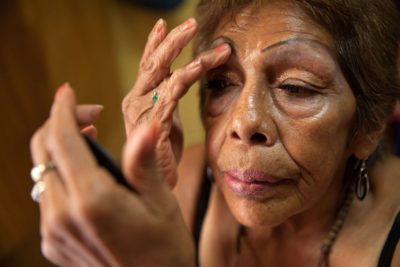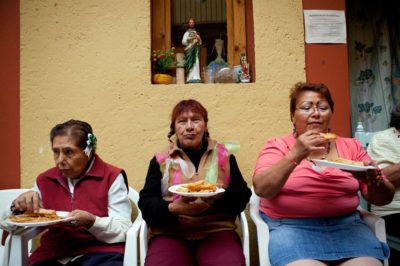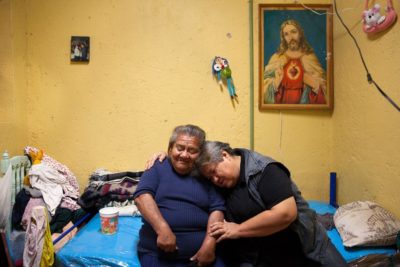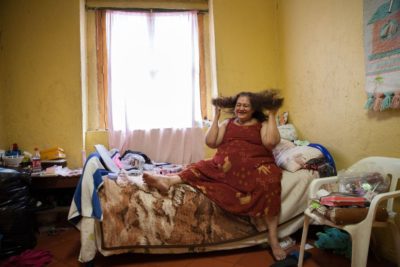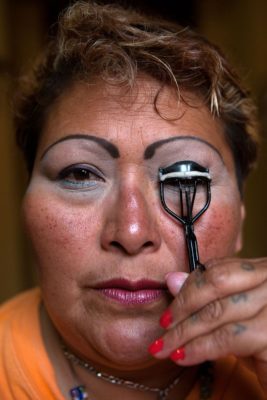
01 Feb The former sex worker who set up a retirement home
After years of working the streets of Mexico City, Carmen Munoz wondered what happened to sex workers like her when they got old – so she campaigned to set up a retirement home.
It was on the historic Plaza Loreto in Mexico City – surrounded by buildings that date back to the 16th Century – that Carmen Munoz set out on her path as a sex worker. She had come to the city looking for work and had been told that the priest at the Santa Teresa la Nueva Church sometimes found jobs for domestic workers.
She was 22, illiterate, and had seven children to feed – including one whom she carried in her arms. For four days she anxiously waited to see the priest, but when she finally succeeded he gave her no help and sent her away.
“He only told me that there was tons of work, and to look for it around the area,” she recalls. “I left crying because it hurt me deeply to hear the priest talk that way.”
At that moment a woman approached Munoz to console her.
“She said to me: ‘That man over there says he’ll give you 1,000 pesos if you go with him,'” Munoz remembers. At the time it seemed a fortune, although at today’s exchange rate – taking into account a 1993 revaluation when one new peso was valued at 1,000 old pesos – it is barely five US cents.
“I said: ‘I’ve never seen 1,000 pesos all in one place – where am I going with him?’
“She said: ‘To a room.’ And I said: ‘A room? How will I know what work to do?’
“‘No!’ she said: ‘You don’t understand, to a hotel.’
“I asked: ‘What’s a hotel?'”
The woman told her bluntly what she would have to do.
When Munoz understood, she was shocked.
“Oh senorita no, no, not that!” she said.
But the woman replied: “You prefer to give it to your husband who doesn’t even provide enough money for soap to wash, than to give it to others who will provide for your children?”
Feeling desperate, she went with the man. He gave her the 1,000 pesos as promised but said he wanted nothing in return. He didn’t want to exploit her desperation, he said, and as she cried he pressed the money into her hand.
Perhaps he knew she would be back.
The following day, Munoz’s despair had turned into defiance. She returned to the same corner in Plaza Loreto thinking to herself: “From now on, my children won’t go hungry any more.”
For the next 40 years she made her living as a sex worker on the corners of the Plaza and surrounding streets.
The area is known as the Merced – 106 bustling blocks that form part of a Unesco World Heritage Site, containing some of the city centre’s oldest buildings, its main commercial hub, and the biggest of the city’s seven red light districts. There is at least one seedy hotel on every block.
“When I first entered sex work I was dazzled by the money,” says Munoz. “I realised I had worth, that someone would pay to be with me, when the father of my children told me that I was worth nothing and that I was very ugly.”
But working on the streets took its toll. Both the authorities and pimps demanded money. Beatings and sexual harassment were common, and she became addicted to drugs and alcohol.
Yet, despite all this, she is grateful.
“Thanks to sex work I was able to take care of my kids and provide them with a roof over their heads – a dignified place to live,” she says.
And years later, she was able to provide a home for others too.
One night, she passed by a dirty, moving tarpaulin on the side of the street. “I went over to it and pulled it up, thinking there were going to be children underneath,” she says. What she found instead were three elderly women huddled together for warmth. She recognised them as fellow sex workers.
“It hurts you, it hurts you as a human being to see them like that,” says Munoz.
She helped the women up, bought them coffee, and got them a room in a cheap hotel.
It made her realise how many elderly women were working in the Plaza. Once their looks had faded, because of their advancing years and the hard life on the streets, many ended up destitute. Their families didn’t want them so they had nowhere to go. Munoz became determined to do something about it.
For the next 13 years she lobbied the city authorities to provide a retirement home for elderly and homeless sex workers. With the support of several well-known artists, neighbours from the Merced and fellow sex workers, she finally persuaded them. The city gave them a large 18th Century building, just a few blocks from Plaza Loreto.
The women’s feeling of elation when they first walked through the doors was immeasurable. “It was an amazing experience,” Munoz says. “We cried with joy, laughed and shouted: ‘Wow, we now have a home!'”
It took a lot of work to clean up the building, a former boxing museum, but in 2006 the first women moved in. They named the shelter Casa Xochiquetzal, after the Aztec goddess of women’s beauty and sexual power.
When I leave the Merced’s cacophonous streets and enter Casa Xochiquetzal, the women are listening to music.
Jewellery and flower-making workshops are under way and the smell of baking fills the air – a dozen residents are busy baking cakes.
While teaching the women new skills, Casa Xochiquetzal also aims to improve their health and well-being by providing self-esteem workshops, medical check-ups and counselling.
Marbella Aguilar’s room off the central courtyard is filled with books – her favourite authors are Pablo Neruda, Leo Tolstoy and Franz Kafka.
“Books have been my refuge since the age of nine,” she says.
As a child, nearly 60 years ago, her parents threw her out. Fortunately another woman took her in but when she died, Aguilar – now 16 – had to find the rent and pay for her studies by herself.
When this proved impossible, she began to sell her body. “There was nothing else I could do,” she says.
Through a mixture of jobs and occasional sex work, Aguilar managed to support her own three children through school. But when a teenage daughter died of leukaemia, she fell into a deep depression, could not work and was thrown out of her home for failing to pay the rent.
At this point Casa Xochiquetzal rescued her and she now makes money selling jewellery in nearby markets.
“This house taught me that my life is worth a lot, that I am as dignified as any other woman,” she says. “Now I say that a woman can lose her honour, but never her dignity.”
Her only sadness is that her surviving children no longer speak to her.
There are currently 25 other elderly or homeless women living in Casa Xochiquetzal – aged from 55 to their mid-80s. Though many have retired, some still work the streets.
Over the past 11 years, more than 250 sex workers have been given shelter here. There have been big challenges though.
Casa Xochiquetzal’s finances are precarious – its grant from the city government has been cut back and it is reliant on charitable donations.
On top of that, not everyone gets along. Although the women are friends and roommates now, some were formerly competitors and enemies on the streets.
“We have been so used, abused, so beaten, and so marginalised, that we are almost always on edge,” explains Munoz. “We have our nails out, ready to attack if we are attacked.”
But disagreements happen in any family, Aguilar says. “Here we have been taught to have respect for each other, that there are things worth fighting for – and that brings harmony to the house.”
And if not harmony, at least a sense of peace, and the reassurance that they will not die uncared-for on the streets.
“We deserve a place where we spend the last days of our lives with dignity and tranquillity,” says Munoz.
One day she expects to move in herself.


